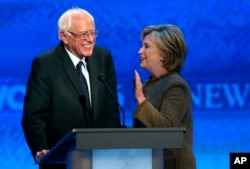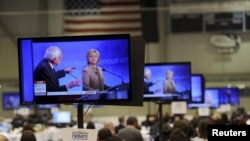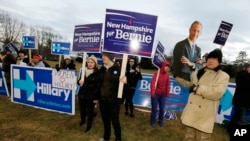The Democratic presidential candidates said in their final debate of the year Saturday they are focused on the U.S. economy and defeating the Islamic State group as their top priorities.
Vermont Senator Bernie Sanders said the United States cannot be thought of as the police of the world, and that the fight against Islamic State needs a coalition that includes Russia and Muslim troops from the region.
“My plan is to make it work, to tell Saudi Arabia that instead of going to war in Yemen, they -- one of the wealthiest countries on Earth -- are going to have to go to war against ISIS. To tell Qatar that instead of spending $200 billion on the World Cup maybe they should pay attention to ISIS, which is at their doorstep.”
Former Secretary of State Hillary Clinton also supports a coalition effort, and said there is a need for support from Sunni and Kurdish forces. She said it would be a strategic mistake to send U.S. ground troops back to the region, as "that's exactly what the militants want to see."
Watch: Candidates outline different approaches to Syria
The third candidate, former Maryland Governor Martin O'Malley, highlighted the need to form new alliances for modern threats, and pointed to the work the African Union has done in Somalia.
Clinton, a frequent target of attacks by Republicans in their debates, called Republican front-runner Donald Trump the "best recruiter" for the Islamic State group. She said responding to terror threats with "bigotry" is not in the country's best interest. She said it is important to make sure Muslims do not feel marginalized at a time when the U.S. needs them most and invoked the lessons learned in the aftermath of the September 11, 2001 terror attacks.
“One of the best things that was done – and [former President] George W. Bush did this and I give him credit – was to reach out to Muslim Americans and say we’re in this together, you are not our adversary, you are our partners. And we also need to make sure that the really discriminatory messages that Trump is sending around the world don’t fall on receptive ears."
She also said there is a need for increased vetting of refugees seeking to enter the United States, while O'Malley said if the refugee crisis gets worse, the United States should be accepting even more.
Breaking the banks
Both Sanders and O'Malley advocated breaking up the nation's largest banks, saying they play a negative role in the nation's economy. Sanders, who prides himself on raising money from individuals instead of large corporate entities, said there is a need to deal with the "recklessness and illegal behavior" on Wall Street and to raise the country's minimum wage.
Clinton, too, said wages need to rise and that people need to feel like their hard work is being rewarded instead of feeling like the economic system is "rigged." She also said she wants to build on the success of President Barack Obama's healthcare initiative, but that there is not enough competition or oversight of health insurance companies, and costs have gone up too much.
Sanders advocated a universal healthcare system, citing higher per-person costs than places like Britain and France. He also accused drug companies of "bribing" Congress.
The issue of gun control brought passionate responses from all three candidates, with O'Malley attacking Sanders' record and branding Clinton as inconsistent in her views.
Clinton said she agrees on the need for common sense gun measures, and that Republicans will not admit a problem even exists. Sanders said nothing will be accomplished unless there is a consensus, and that he has stood up to the pro-gun lobby.
Sanders apologizes
Sanders was asked first to address the breach of a key Clinton voter database by a member of his staff, and apologized to her. She accepted the apology and said it was important to move forward. O'Malley, too, said there are bigger issues and the related bickering is the kind of distraction that plagues government.
Late Friday, Sanders filed a federal lawsuit aimed at forcing the Democratic National Committee to restore its voter database access, which the committee had suspended after Sanders' workers improperly viewed proprietary information belonging to the Clinton campaign. As the feud erupted, the Sanders' camp acknowledged the breach and called its campaign staffer's role in it "unacceptable." The staffer was later fired.
Clinton spokesman Brian Fallon said the Sanders campaign had conducted 25 searches of proprietary information in a 50-state data base, after a DNC digital firewall separating Clinton and Sanders accounts was breached. He also accused the Sanders staff of saving the Clinton data.
However, the DNC later agreed to restore Sanders' access to his campaign's data, after it said the Sanders camp had provided an accounting of how the Clinton information was used and whether it was disposed of.
The squabble thrust into the open long-standing suspicions expressed by Sanders and his supporters that the national party is unfairly working to support Clinton's candidacy.
Sanders campaign manager Jeff Weaver pointed to the party's limited number of debates at low-viewership periods, like Saturday nights, as another example.
With just six weeks before the Iowa caucuses, the first voting in the presidential candidate selection process, analysts largely agree that Sanders, who trails Clinton by nearly 20 percentage points in voter surveys, must find ways to highlight his goals. But he must do so without antagonizing supporters of Clinton, who is deeply popular across wide sectors of her party.
Clinton still frontrunner
Ahead of the debate in the northeastern state of New Hampshire, national polls indicate Clinton leads Sanders by more than 20 points, with a slightly smaller margin in Iowa where voters will first have their say in the race on February 1. Sanders had a small lead in polls in New Hampshire, which votes February 9. O'Malley has single-digit support in all of the polls.
Sanders most likely needs a win in both states to mount a serious challenge to Clinton, who will be heavily favored in the next state contests in Nevada and South Carolina, and in a "Super Tuesday" round of voting in 11 states on March 1.
"The reality for Sanders is he's only got a couple more shots to change the dynamic of the race," said Democratic strategist Chris Kofinis. "The only choice he's got is to shake the race up."
Some information for this report came from Reuters.









